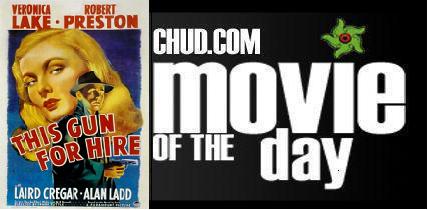
The Film: This Gun For Hire (1942)
The Principals: Alan Ladd, Veronica Lake, Robert Preston, Laird Cregar, Tully Marshall, William Tuttle (director)
The Premise: Willard Gates (Cregar) hires Raven (Ladd) to bump off some scientist, and then pays him with “hot bills” that put him in the crosshairs of the police. Raven is a killer, so he doesn’t take kindly to this. Ellen Graham (Lake) is a singer/magician who Gates hires for his nightclub and who’s engaged to Detective Michael Crane (Robert Preston), and also sits next to Raven on her ride from San Fransisco to Los Angeles. When Gates sees the two together, he assumes the worst and alerts the police, which makes Raven kidnap Ellen. From there the players move as Raven wants revenge, and Crane wants to protect his lady, while also catch Raven.
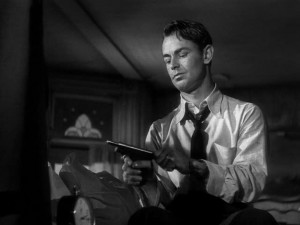
Is It Good?: At the The Wright Stuff film festival Edgar Wright asked Walter Hill about the influence of Le Samourai on The Driver – which seems readily apparent. Hill was (as to be expected) gruff in his response and said “well, it all goes back to This Gun for Hire.” And when the New Beverly recently showed This Gun for Hire, I decided it was time for a revisit. I had seen the film years ago and liked it, but it’s very much a museum piece in its way. Likely when I watched it I didn’t have much context to how the film shaped the history of cinema, because it didn’t leave much of an impression and I saw it before Le Samourai was even available stateside. The film didn’t register deeply, and I think has something to do with the impression Veronica Lake made as a Femme Blanc.
Our own Elizabeth Rappe wrote a defense of Lake, or at least a desire to have more of her films readily available. Part of the appeal of going to the New Beverly for This Gun for Hire was that it was on a double bill with The Glass Key, which hasn’t hit DVD. But Lake seems to have about one look, and never mastered performance beyond knowing her dialogue. From this film she can be flirty, but when pressed to deal with violence and danger, she rarely raises her pulse.
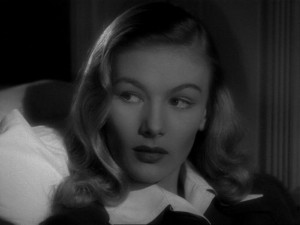
There are two things that mark This Gun for Hire as a film worthy of its place in history that have nothing to do with Lake, and both elevate the film in some way. The first is that Gun appears to be the first movie to feature a romanticized hit man. Even if there were assassins in films before, it cemented the trench coat and hat look that was used by Jean Pierre Melville in Le Samourai, and the cool often associated with them. Trench coats in cinema are usually impossibly stylish, whereas in modern living it’s the uniform of the fat, the nerdy, the flasher, or – usually – school shooters. And if nothing else, this is the film that romanticized the hired gunman, turning them into the beleaguered professional dealing with cohorts who usually are trying to get one over on them, which often leads to more violence. It was also the film that turned Alan Ladd into a star, partly because he could manage to play taciturn and in control. Of course, he also gets s scene to admit he’s pathological (surely to get the film past the censors), and another where he decides to actively help Veronica Lake, as she’s been sequestered by the government to get information on Willard Gates, who runs a nightclub but also works for a chemical factory during the day (some of the plot points’ connective tissues are altogether too convenient, but I guess they had to work in two Lake numbers into a eighty minute movie).
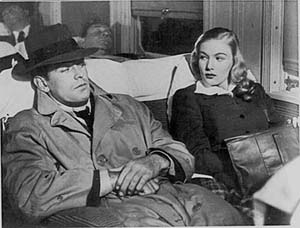
The second thing that seems revelatory is that Ladd’s character is one of the first anti-hero leads. The film lists Lake and Robert Preston as the stars with Ladd pushed to the bottom of the second page of credits with “introducing Alan Ladd as Raven,” but I don’t think anyone mistakes Robert Preston as the lead of the film. In fact, Preston barely registers much of a presence, and Ladd and Lake have way more chemistry together – albeit as two objects that one can project sexual appetite on to, more so than an explicit chemistry. (Side note to side note, and woman to woman, they appear to be more openly coupled in The Glass Key and have about as much heat together.) Ladd comes across as cool and collected, though not a great leading man, where later directors understood what it meant to be an object or vacuum as a professional (see Le Samourai or The Driver), but Frank Tuttle’s film is smart enough – or open enough – to use these as assets to the narrative, and it’s an obviously sneaky sort of film in its way. But the great thing about Ladd’s character is that he is a killer; the film opens with him killing a bystander, and then flirts with killing a child who might be something of a witness. But it’s also his film, because he’s just a pawn in Gates’s and millionaire Alvin Brewster’s (Tully Marhsall) plan to sell poison to the Japanese during World War II. Raven is a bad guy, but he’s not the antagonist. Ladd wants his revenge and will take out the traitors, but he doesn’t give a damn about the politics of it. So he becomes a force for good, but not out of any greater moral sense – only out of revenge. Because he likes Lake’s character (she gives him a mostly chaste kiss), he does it partly her way. The film downplays the sexuality or their relationship (or was dealing with two actors who couldn’t convey it), but the audience could put it in at the time, and now (obviously).
Lake seems an embodiment of what would come to be old hat in Hollywood, the press-star. For Hollywood, Veronica Lake was the manufactured proof that you can come to Hollywood and get in the picture business, and her value was more as object than talent. She at least – between this and Sulivan’s Travels – was in a couple good movies, but like Megan Fox now, their fame seems more important than anything their supposedly chosen profession would suggest.
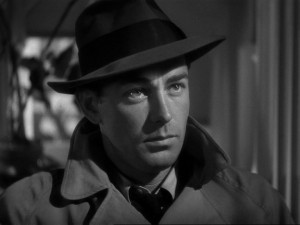
Is It Worth a Look: Of course. This is obviously a seminal work, and at 80 minutes, it’s an easy breezy watch. And – as I’ve said – there’s lot of interesting things in the work, though Frank Tuttle’s direction is very much of the old school shooter variety, which may be a little dull for modern viewers. Then again, the speed to which the narrative moves is refreshing.
Random Anecdotes: There’s a shot of Ladd running from the cops in a train station that seems to have direct corollaries to both Le Samourai and Hard Target. The film is expressly referenced in L.A. Confidential, which has probably done more for Veronica Lake than her career did *rimshot